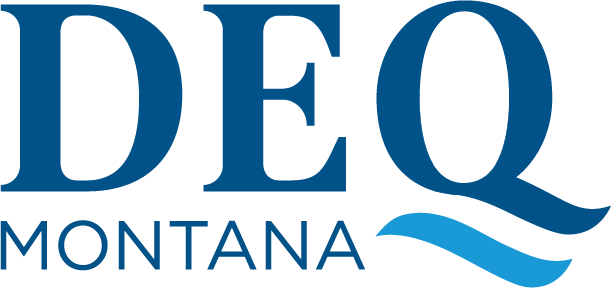Are You Experiencing Flooding?
Surging rivers and creeks are a regular springtime occurrence in parts of Montana. DEQ provides support and resources for Montanans who are affected by flooding. This page serves as a one-stop-shop for all DEQ information related to flooding.
Public Water & Wastewater System Support
If you are experiencing or anticipate that you may experience issues related to flooding, please contact DEQ's Public Water Supply Emergency Coordinator for support and guidance related to the security and safety of your public water system.
- Contact: Kirk Yoder (406) 444-7494
If you operate a wastewater system that is experiencing flooding related issues, please contact DEQ immediately for information and support.
- Contact: Chris Romankiewicz (406) 556-4514
An unintentional discharge of raw sewage from a sanitary sewer (sanitary sewer overflow), which does not occur at the designated waste water treatment plant outfall, can seriously endanger public health and contaminate waters, causing serious water quality problems.
Permittees are required to adhere to the following oral and written reporting timelines.
24-Hour Notification
Information must be provided orally to the Department of Environmental Quality (DEQ) within 24 hours from the time the overflow was discovered. The 24-hour report of noncompliance must be made to the DEQ Water Protection Bureau at (406) 444-5546 or 444 - 6697 or to the state Office of Disaster and Emergency services at (406) 431-0411.
Written Report
A written report must be provided within five days from the time the overflow was discovered. All sanitary sewer overflows, no matter the circumstances or cause, must be reported to DEQ, even if you do not believe a violation has occurred. See the reporting form below for additional information.
How to Reduce Flood Damage
Maintain and restore areas of native riparian vegetation along streams. Densely vegetated buffers of native trees, shrubs and plants help hold streambanks together, slow down flood waters, and filter out debris. DEQ’s Nonpoint Source Program may be able to help with technical guidance or grant support.
- Contact: Hannah Riedl 406-444-0549
- Large Woody Debris Fact Sheet
Environmental Incident Reporting
Montana Disaster & Emergency Services Resources
- Montana DES Recovery Program Page
- FEMA Public Assistance Program and Policy Guide (FEMA, 2020)
- FEMA Public Assistance Debris Removal Requirements - Requirements to ensure eligibility for reimbursement under this program
Current Situational Awareness Report
Bank Stabilization, Riprap, and Floodplain Management
Stabilizing eroding banks with riprap and other hard armor creates a fire hose effect on streams, increasing the force of flood waters and transferring erosion problems downstream. Protecting and restoring floodable area on the landscape slows floodwater and reduces catastrophic impacts when floods do occur.
Anyone performing bank stabilization must notify the appropriate agencies including the U.S. Army Corps of Engineers (USACE), local conservation district and, if riprap will be installed, Montana Fish, Wildlife & Parks (FWP).
- DEQ: Keenan Storrar, 401 Certification/Dredge and Fill Permit (406) 444-2734
- DEQ: Hannah Riedl, Nonpoint Source Program (406) 444-0549
- FWP: Fisheries Habitat Section, (406) 444-2449
- Local Conservation District Directory (2023)
- USACE: Montana.Reg@usace.army.mil (406) 441-1375
- USACE Submission Requirements
- USACE Riprap Prohibited Materials (USACE, 2013)
- USACE Best Management Practices (USACE, 2021)
- The Upper Yellowstone River is designated a Special River Management Zone. Additional regional conditions (USACE, 2021)
Montana DNRC Floodplain Management Resources
- Floodplain Management Program Website
- Local Floodplain Program Administrator Directory - Look for a .PDF directory under "Local Contacts"
- Floodplain Management Program Website
- Local Floodplain Program Administrator Directory - Look for a .PDF directory under "Local Contacts"
Recovery & Reconstruction Support
If you have questions about the mine permit status for gravel sources for recovery work, contact DEQ's Opencut Mining Program:
- J.J. Conner (406) 444-4979 or Bailey Tasker (406) 444-0219
If you have questions about the mine permit status for crushed gravel or rip rap sources, contact DEQ’s Hard Rock Mining Program:
- Millie Olsen (406) 444-2461
If you have questions about hazardous waste or solid waste disposal, contact DEQ's Waste Management Bureau:
- Hazardous Materials Section (406) 444-5300
- Solid Waste Section (406) 444-5300
Additional Resources
DEQ resources include a flood guide and checklists related to underground storage tanks, emergency guidance related to asbestos-containing materials, information on protecting wells before a flood, information on disinfecting water supplies after a flood, and information on managing septic systems after a flood.
- Asbestos Emergency Guidance (DEQ, 2022)
If you are without power or natural gas service, please contact your service provider to report the outage. Links to more information are provided below.
- Protecting Your Water Supply - Before the Flood (DEQ, 2019)
- Disinfecting Your Water Supply (DEQ, 2019)
If you do not find what you are looking for on this page or still have questions, you can always contact us.
